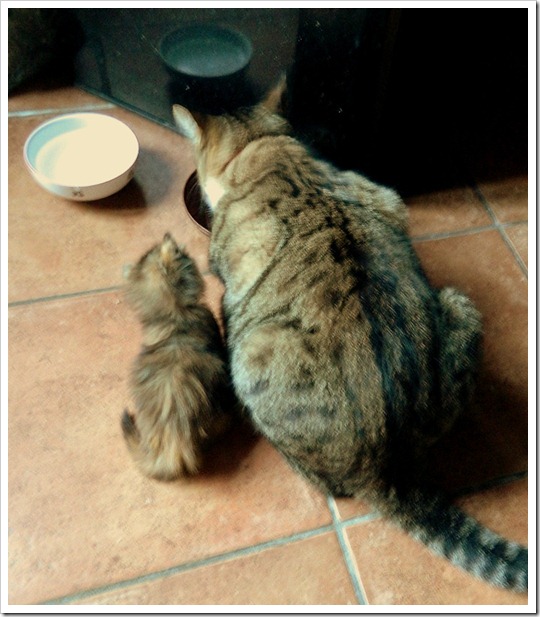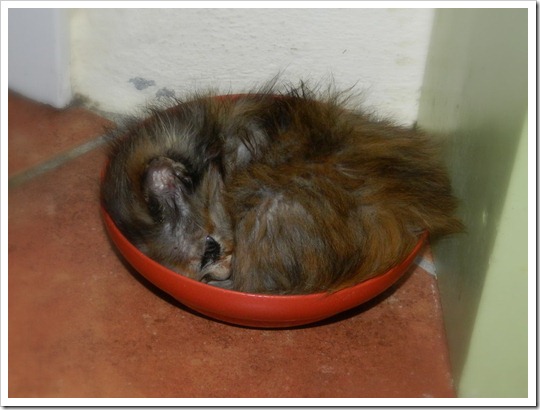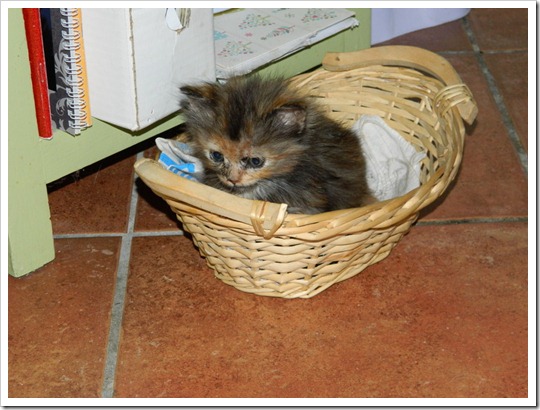Now It’s Your Turn – The Translations Posted by Geoff on Oct 10, 2014 in Grammar, Italian Language
Italian translations by Serena, photos by Geoff
So, how did you get on with your English to Italian translations of Lucky Number Seven – Now It’s Your Turn? Here are our versions for reference. N.B. As you will see, there may be several possible translations for some of the sentences.
a. I found the kitten three weeks ago when I was out in the garden = tre settimane fa ho trovato un gattino mentre ero fuori in giardino
b. when Serena first saw what I’d found she thought it was a dormouse = quando Serena ha visto per la prima volta quello che (cosa) avevo trovato ha pensato che fosse un ghiro
c. the microscopic creature was completely dirty and mewing desperately = quella microscopica creatura era completamente (del tutto / totalmente) sporca e miagolava disperatamente
d. it took me a long time to clean the kitten using the cat brush = mi ci è voluto molto tempo (tanto / un mucchio / sacco di tempo) per pulire il gattino usando la spazzola per i gatti
e. Serena warmed up some milk so that we could feed her = Serena ha riscaldato un pochettino di latte per darle da mangiare (per poterle dar da mangiare / in modo di poterle dar da mangiare)
f. the kitten was really hungry, it gobbled down the milk in the blink of an eye! = il gattino era davvero (molto / proprio) affamato, si è poppato il latte in un batter d’occhio!
g. she had one white front paw and one black one = aveva una zampina anteriore bianca e una nera
h. we put her in the cat carrier with my old cardigan, and she finally fell asleep = l’abbiamo messa nella sportina per i gatti con il mio vecchio (antico) giacchetto, e finalmente si è addormentata
 |
| So that’s how you do it! |
i. feeding the kitten is painful due to her very sharp claws = dar da mangiare al gattino è doloroso per via (a causa) delle sue unghiette affilatissime (dei suoi artigli affilatissimi)
j. Serena finds an old pair of gloves to protect her hands = Serena trova un vecchio paio di guanti per proteggersi le mani
k. the vet confirmed our suspicions that the kitten is female = il veterinario ha confermato i nostri sospetti che è una gattina
l. we name her Amber, or Ambra in Italian = l’abbiamo chiamata Amber, o Ambra in italiano
m. Amber learns something new every day = Amber impara qualcosa di nuovo ogni giorno (tutti i giorni)
n. she observes the other cats and copies what they do = osserva gli altri gatti e copia quello (ciò) che fanno
o. when she tries to scratch her ear with her back leg she falls over = quando prova a grattarsi l’orecchio con la zampina posteriore (di dietro) cade (casca) giù
p. in a few days we should be able to start weaning her = fra qualche giorno (fra pochi giorni) dovremmo riuscire a cominciare lo svezzamento (a svezzarla)
 |
| Hmmm, this bowl makes a perfect bed … it’s just the right size. |
q. little Amber loves exploring the house = la piccola Ambra ama (adora) esplorare la casa / alla piccola Ambra piace molto esplorare la casa
r. she’s good at dropping down off things but getting up again is much harder = è brava a lasciarsi cadere (andare giù) dalle cose ma risalire (rimontare) su è molto più difficile (problematico)
s. watching Amber has become our favourite pastime = osservare (guardare) Ambra è diventato il nostro passatempo preferito (favorito)
t. when she decided to climb up inside my trousers we couldn’t stop laughing! = quando ha deciso di arrampicarsi dentro ai miei pantaloni (calzoni) non riuscivamo a smettere (non potevamo smettere) di ridere!
u. I don’t think she’ll do it again though, because she’s getting too big = però, non penso che lo rifarà, perché sta diventando troppo grande
 |
| Well, perhaps this basket is a bit more comfortable … |
Latest Headlines
v. Amber has begun eating cat biscuits from a bowl = Ambra ha cominciato a mangiare i croccantini dalla ciotola
w. she’s also started using the litter tray, bur doesn’t always get there in time! = ha pure (anche) cominciato ad usare la lettiera, ma non sempre ci arriva in tempo!
x. our other cats are beginning to accept or at least tolerate her = i nostri altri gatti (gli altri gatti) stanno cominciando ad accettarla o almeno (per lo meno) a tollerarla
y. the two males, Smokey and Cocò are very patient with her = i due maschi, Smokey e Cocò sono molto pazienti con lei (verso di lei)
z. the four females less so, but we’re gradually getting there = le quattro femmine meno, ma pian pianino ci stiamo arrivando (ce la stiamo facendo / ci stiamo riuscendo)
Well done to everyone who posted their translations, you all did really well! If you have any questions please leave a comment.

Build vocabulary, practice pronunciation, and more with Transparent Language Online. Available anytime, anywhere, on any device.




Comments:
Raj:
Ciao Serena and Geoff,
Thanks a lot. I realized my mistakes.
One question : In “ma risalire (rimontare) su è molto più difficile”, is it okay to use only molto or only più?
ps : Adoro la piccola Ambra! 🙂
Raj
Serena:
@Raj Salve Raj! E’ grammaticalmente corretto dire “è più difficile” = “it’s harder” o “è molto difficile” = “it’s very hard”. Tuttavia “molto più difficile” significa “much harder”. La frase inglese era “is much harder”.
Va bene?
Saluti da Serena
Raj:
Salve Serena.
Ho capito. Vorrei imparare esattamente frasi come questi che la gente usano sempre.
Grazzi Mille.
Buon weekend!
Raj